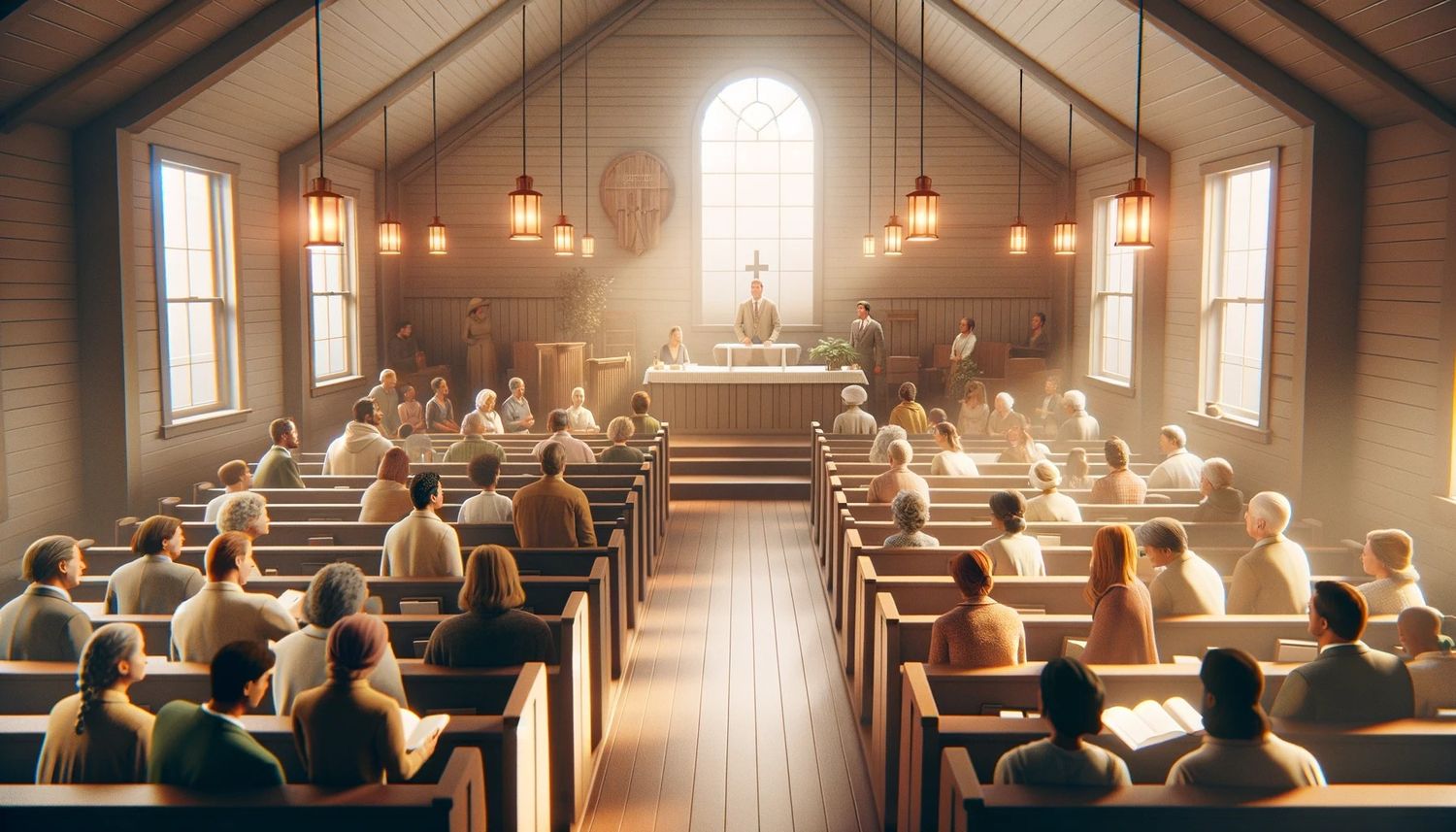Home>Theology and Spirituality>What Is Bedside Baptist


Theology and Spirituality
What Is Bedside Baptist
Published: February 20, 2024
Jason DeRose, Managing Editor at Christian.net, uses his expertise in religion and journalism to deepen understanding of faith's societal impacts. His editorial leadership, coupled with a strong academic background, enriches the platform’s diverse content, earning him recognition in both journalism and religious circles.
Discover the meaning and practice of Bedside Baptist in theology and spirituality. Explore the significance and impact of this religious concept.
(Many of the links in this article redirect to a specific reviewed product. Your purchase of these products through affiliate links helps to generate commission for Christian.net, at no extra cost. Learn more)
Table of Contents
Introduction
Bedside Baptist is a term that has gained popularity in religious and spiritual circles, often evoking curiosity and prompting questions about its meaning and significance. This unconventional term is not found in traditional religious texts or formal theological discourse, yet it holds a unique place in the vernacular of individuals who identify with a particular approach to spirituality. As we delve into the world of Bedside Baptist, we will explore its definition, origins, practices, and criticisms, shedding light on its relevance in contemporary spiritual conversations.
This article aims to provide a comprehensive understanding of Bedside Baptist, offering insights into its cultural and spiritual implications. Whether you are familiar with this term or encountering it for the first time, this exploration will unravel the layers of meaning behind Bedside Baptist and its impact on individuals' spiritual journeys. Let's embark on this enlightening journey to uncover the essence of Bedside Baptist and its place in the tapestry of modern spirituality.
Read more: What Was John The Baptist’s Baptism For?
Definition of Bedside Baptist
Bedside Baptist is a colloquial term used to describe a practice in which individuals choose to worship or engage in spiritual activities from the comfort of their own beds, rather than attending a formal religious service or gathering. This term humorously combines the idea of being in bed with the concept of Baptist, a Protestant Christian denomination known for its emphasis on congregational worship and community fellowship. While it is not a recognized denomination or religious movement, Bedside Baptist represents a personal and often informal approach to spirituality.
Those who identify with Bedside Baptist may do so for various reasons, such as personal reflection, relaxation, or a desire for solitude during moments of spiritual connection. This practice is not confined to a specific faith tradition and is not exclusive to Baptists; rather, it transcends denominational boundaries and resonates with individuals seeking a more intimate and personalized spiritual experience.
The term "Bedside Baptist" is often used lightheartedly, reflecting a sense of humor and self-awareness about the choice to forgo traditional religious gatherings in favor of a more casual and individualized approach to spirituality. It embodies the idea that one's connection with the divine can be nurtured and sustained in the comfort of one's own space, free from the formalities and structures of organized religious institutions.
In essence, Bedside Baptist represents a departure from conventional religious practices, offering a glimpse into the evolving landscape of spirituality in contemporary society. It underscores the autonomy of individuals in shaping their spiritual experiences and the fluidity of religious expressions in the modern world. This concept invites contemplation on the diverse ways in which people seek meaning, connection, and transcendence within the context of their everyday lives.
As we continue to explore the multifaceted nature of spirituality, Bedside Baptist serves as a reminder that the pursuit of the divine is not confined to specific locations or prescribed rituals. Instead, it highlights the deeply personal and adaptable nature of spiritual exploration, inviting individuals to find solace, inspiration, and communion with the sacred from the intimate setting of their own bedside.
Origins of Bedside Baptist
The origins of the term "Bedside Baptist" can be traced to the intersection of humor, spirituality, and the evolving dynamics of religious practices. While the exact moment of its inception remains elusive, the concept likely emerged as a playful and relatable way to describe the choice of individuals to engage in spiritual activities from the comfort of their beds.
The term "Bedside Baptist" embodies a lighthearted approach to spirituality, reflecting the human inclination to infuse humor into everyday experiences, including matters of faith and devotion. It encapsulates the idea that one's spiritual journey is not confined to formal settings or structured rituals, but can unfold in the familiar and cozy confines of one's bedroom.
The emergence of Bedside Baptist also reflects broader societal shifts in attitudes toward organized religion and the concept of sacred space. As individuals increasingly seek personalized and flexible approaches to spirituality, the notion of creating a sacred space within the intimate setting of one's bedroom resonates with the desire for autonomy and authenticity in spiritual expression.
Furthermore, the rise of digital connectivity and virtual communities has redefined the boundaries of religious engagement, allowing individuals to participate in religious services and spiritual teachings from virtually anywhere, including their beds. This interconnectedness has contributed to the blurring of traditional distinctions between physical and virtual sacred spaces, giving rise to the idea that spiritual communion can transcend physical boundaries.
The term "Bedside Baptist" has thus become emblematic of the evolving landscape of spirituality in the modern era, where individuals are reimagining the ways in which they connect with the divine and cultivate their inner lives. It symbolizes a departure from rigid religious structures and an embrace of fluid, individualized expressions of faith and transcendence.
In essence, the origins of Bedside Baptist are rooted in the convergence of humor, personal autonomy, and the evolving dynamics of spiritual engagement. This whimsical yet profound concept invites contemplation on the adaptability and resilience of spirituality in the face of changing cultural and technological landscapes. It serves as a testament to the enduring human quest for meaning, connection, and spiritual fulfillment, even from the cozy confines of one's bedside.
Practices of Bedside Baptist
The practices of Bedside Baptist encompass a diverse array of spiritual activities and contemplative rituals that individuals engage in from the comfort of their own beds. While the specific practices may vary widely based on personal preferences and beliefs, they collectively reflect a deeply personal and intimate approach to spirituality. Here are some common practices associated with Bedside Baptist:
-
Personal Reflection and Meditation: Many adherents of Bedside Baptist embrace the tranquility of their bedside as a conducive space for personal reflection and meditation. In the quietude of the morning or the serenity of the evening, individuals may find solace in introspective practices that foster a sense of inner peace and spiritual connection.
-
Prayer and Devotional Reading: Bedside Baptist practitioners often engage in prayer and devotional reading as a means of nurturing their spiritual lives. Whether reciting traditional prayers, expressing personal supplications, or delving into sacred texts, individuals find spiritual nourishment and guidance within the sanctuary of their own beds.
-
Listening to Sermons and Spiritual Teachings: With the advent of digital technology, many individuals partake in the virtual congregation of sermons and spiritual teachings from the comfort of their beds. Through online platforms and streaming services, Bedside Baptist adherents access a wealth of religious and inspirational content, fostering a sense of connection to broader spiritual communities.
-
Journaling and Creative Expression: The practice of journaling and creative expression holds significance for many followers of Bedside Baptist. Whether through writing, drawing, or other artistic endeavors, individuals channel their spiritual insights and experiences into tangible forms of expression, fostering a deeper understanding of their inner lives and relationship with the divine.
-
Mindfulness and Gratitude Practices: Embracing the spirit of mindfulness and gratitude, practitioners of Bedside Baptist cultivate a heightened awareness of the present moment and express gratitude for the blessings in their lives. These practices serve as anchors for spiritual grounding and appreciation, fostering a sense of contentment and connectedness.
-
Contemplation and Spiritual Study: Bedside Baptist offers a tranquil setting for contemplation and spiritual study, allowing individuals to explore theological concepts, engage in philosophical inquiries, and deepen their understanding of their faith traditions or spiritual philosophies.
These practices, among others, exemplify the rich tapestry of spiritual engagement that unfolds within the realm of Bedside Baptist. They underscore the deeply personal and adaptable nature of spirituality, inviting individuals to cultivate their spiritual lives in ways that resonate with their innermost aspirations and inclinations. In the intimate space of their beds, practitioners of Bedside Baptist find solace, inspiration, and communion with the sacred, embracing a form of spirituality that transcends traditional boundaries and resonates with the yearning for a meaningful and authentic connection with the divine.
Criticisms of Bedside Baptist
While Bedside Baptist embodies a personalized and intimate approach to spirituality, it is not exempt from criticisms and concerns raised by various individuals and religious communities. These criticisms often stem from differing perspectives on the nature of religious practice and communal engagement. Some of the notable criticisms of Bedside Baptist include:
-
Lack of Community Engagement: One common critique of Bedside Baptist is the perceived absence of active participation in communal worship and fellowship. Traditional religious settings emphasize the significance of congregational gatherings, communal rituals, and shared spiritual experiences as integral components of religious life. Critics argue that the solitary nature of Bedside Baptist may lead to a sense of isolation and a diminished sense of community, which are considered essential for spiritual growth and mutual support.
-
Potential for Spiritual Isolation: Critics express concerns about the potential for spiritual isolation and disconnection from the broader religious community among adherents of Bedside Baptist. They argue that the absence of regular interaction with fellow believers and spiritual leaders may hinder the development of a robust support network and opportunities for collective worship, mutual encouragement, and communal service.
-
Diminished Accountability and Guidance: Another criticism revolves around the perceived lack of accountability and guidance in the practice of Bedside Baptist. In traditional religious settings, individuals benefit from the pastoral care, mentorship, and communal accountability provided by religious leaders and fellow congregants. Critics contend that the absence of regular engagement with religious authorities and the broader faith community may lead to a diminished sense of spiritual guidance and oversight.
-
Potential for Superficial Engagement: Some critics raise concerns about the potential for superficial engagement with spirituality and religious teachings among practitioners of Bedside Baptist. They argue that the informality and comfort of the home environment may lead to a casual or diluted approach to spiritual practices, potentially hindering the depth of spiritual growth and understanding that can be fostered through active participation in formal religious settings.
-
Impact on Charitable and Social Initiatives: Critics also highlight the potential impact of Bedside Baptist on charitable and social initiatives typically associated with organized religious communities. They express concerns about the reduced involvement in community service, charitable endeavors, and social outreach that may result from a predominantly individualized approach to spirituality.
It is important to note that these criticisms are not universally held, and individuals who identify with Bedside Baptist may have differing perspectives on these concerns. While acknowledging these criticisms, proponents of Bedside Baptist emphasize the value of personal autonomy, spiritual authenticity, and the diverse ways in which individuals seek meaning and connection within their spiritual journeys. The dialogue surrounding these criticisms invites reflection on the evolving dynamics of spirituality and the complex interplay between individual expression and communal engagement within the realm of faith and devotion.
Read more: What Is A Baptist University
Conclusion
In conclusion, the concept of Bedside Baptist offers a fascinating glimpse into the evolving landscape of spirituality, reflecting the deeply personal and adaptable nature of individuals' spiritual journeys. This lighthearted yet profound term encapsulates the choice of many to engage in spiritual activities from the comfort of their own beds, transcending traditional religious structures and embracing a more individualized approach to faith and devotion.
The practices associated with Bedside Baptist, including personal reflection, prayer, mindfulness, and spiritual study, underscore the rich tapestry of spiritual engagement that unfolds within the intimate setting of one's bedroom. These practices exemplify the autonomy and authenticity with which individuals seek meaning, connection, and transcendence within their spiritual lives, highlighting the fluidity and resilience of spirituality in the face of changing cultural and technological landscapes.
While Bedside Baptist has garnered appreciation for its emphasis on personal autonomy and spiritual authenticity, it is not without criticisms. Concerns regarding potential isolation, diminished community engagement, and accountability have been raised, reflecting differing perspectives on the nature of religious practice and communal involvement. These criticisms invite thoughtful reflection on the complex interplay between individual expression and communal engagement within the realm of faith and devotion.
Ultimately, the concept of Bedside Baptist serves as a testament to the enduring human quest for meaning, connection, and spiritual fulfillment. It invites individuals to contemplate the diverse ways in which they can cultivate their spiritual lives, find solace, inspiration, and communion with the sacred, and embrace a form of spirituality that resonates with their innermost aspirations and inclinations. As the modern world continues to witness shifts in religious attitudes and practices, Bedside Baptist stands as a compelling symbol of the adaptability and resilience of spirituality in the lives of individuals seeking a meaningful and authentic connection with the divine.














